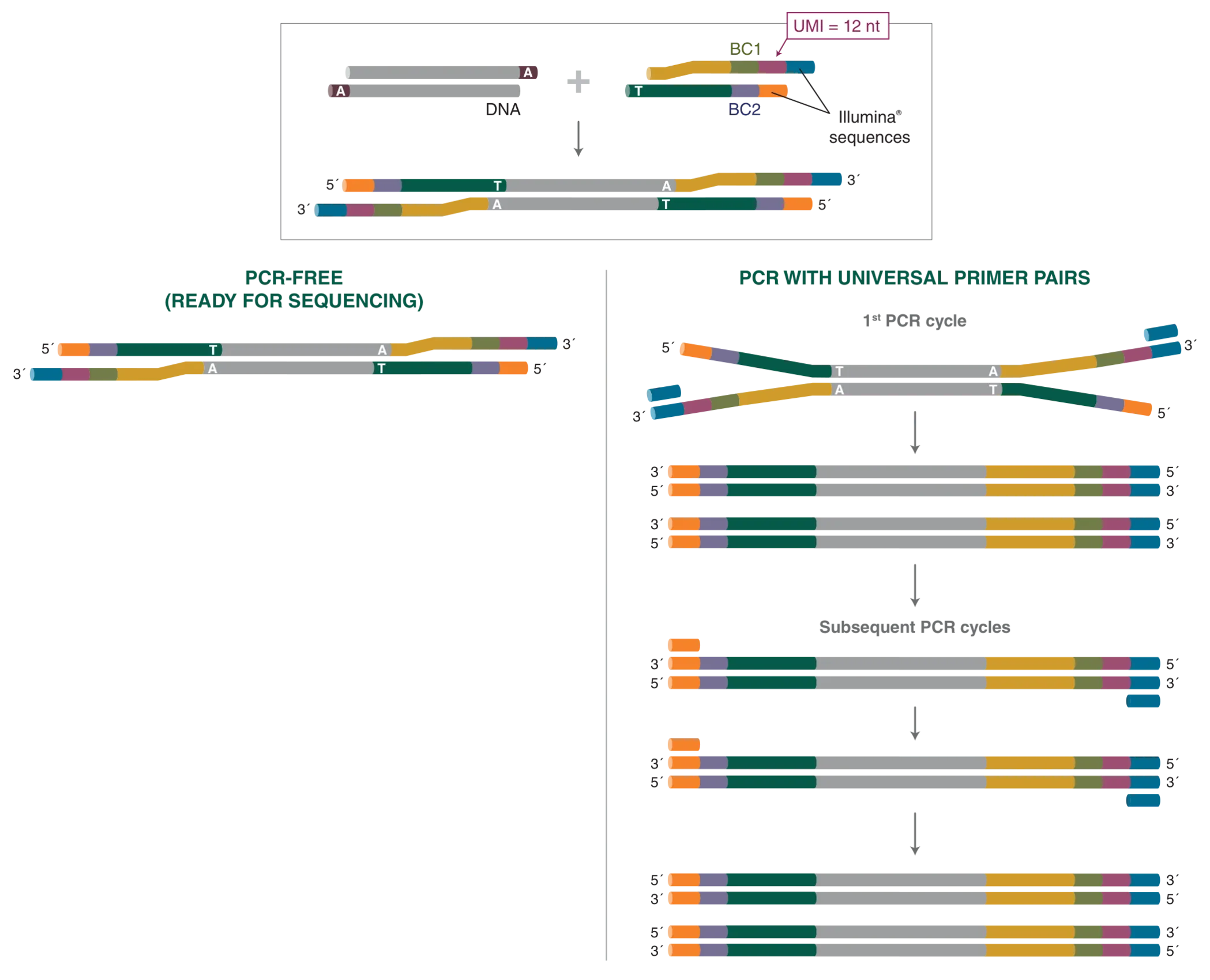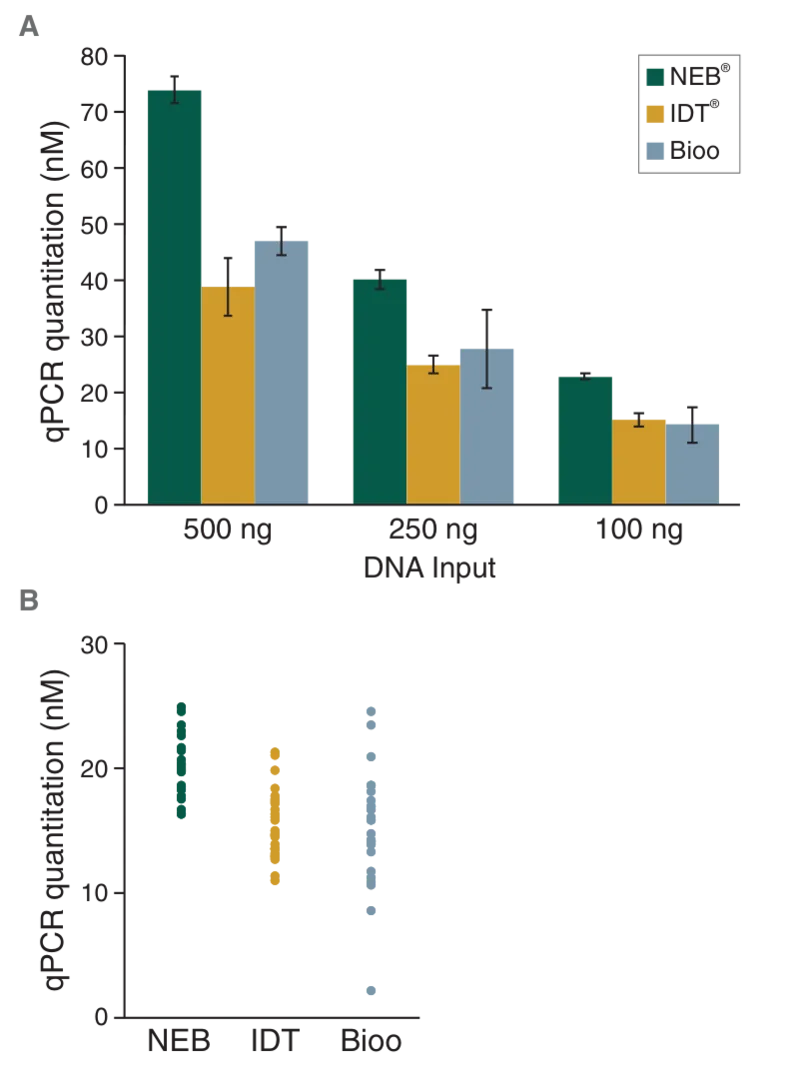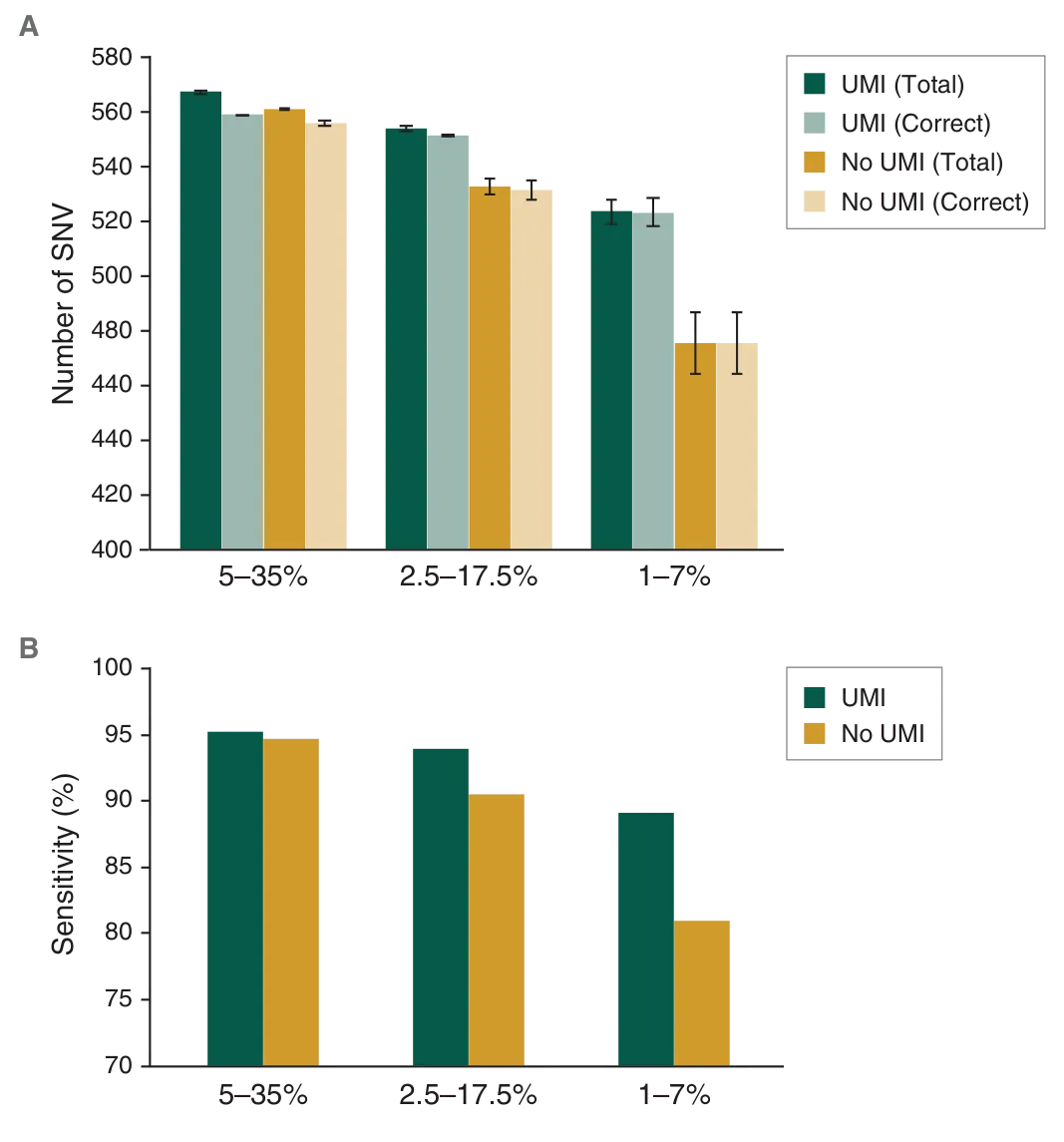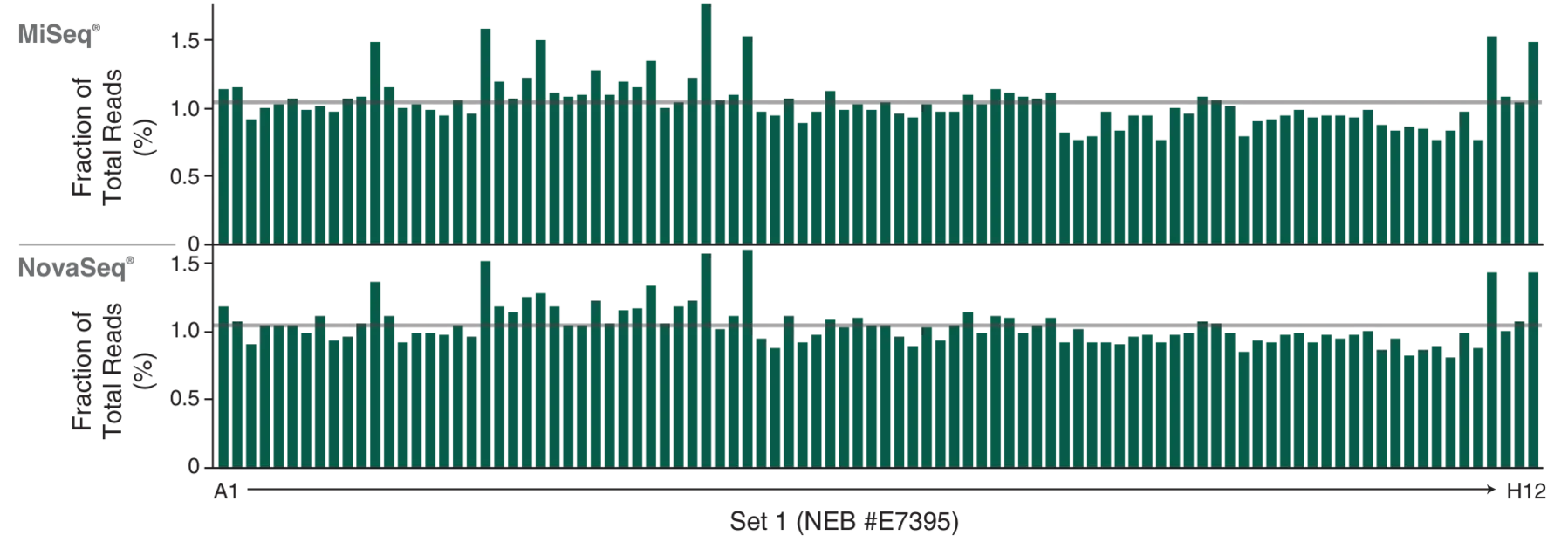NEBNext® Multiplex Oligos for Illumina® (Unique Dual Index UMI Adaptors DNA Set 1)
Product information| Code | Name | Size | Quantity | Price | |
|---|---|---|---|---|---|
E7395S |
NEBNext Multiplex Oligos for Illumina (Unique Dual Index UMI Adaptors DNA Set 1) |
96 rxns | - | Unavailable in your region | |
E7395L |
NEBNext Multiplex Oligos for Illumina (Unique Dual Index UMI Adaptors DNA Set 1) |
384 rxns | - | Unavailable in your region |
NEBNext® Multiplex Oligos for Illumina® (Unique Dual Index UMI Adaptors DNA Set 1)
For details on how to combine UMI adaptors with our NEBNext library prep kits, click the product information tab below.
Catalog #E7395
Product Introduction
NEBNext® Multiplex Oligos for Illumina® are an essential piece of the NEBNext suite of library preparation products, available in several different configurations for use with NEBNext products or other standard Illumina-compatible library preparation protocols. This set was designed and optimized for use in DNA sequencing workflows, including PCR-free. These unique dual index adaptors also include a 12-nt unique molecular identifier (UMI) sequence to enable the identification and removal of PCR errors or duplicates from amplified libraries. Supplied as 96 unique, pre-annealed index adaptors with UMIs, packaged in a single-use 96-well plate with a pierceable foil seal. Universal primers are included for applications requiring PCR amplification.
Three other sets of Unique Dual Index UMI Adaptors are available for DNA library prep (NEB #E7874, NEB #E7876, and NEB #E7878), providing sufficient indices to multiplex up to 384 samples. NEBNext Unique Dual Index UMI Adaptors for RNA-seq (NEB # E7416) are also available, as well as single, dual, and unique dual index primers, plus an optimized adaptor.
For additional information on available indices and formats for multiplexing, please refer to the NEBNext Multiplex Oligos Selection Chart.
- Index adaptors enable PCR-free library preparation
- Superior and reliable ligation efficiency
- More-sensitive detection of low-frequency single-nucleotide variants (SNVs)
- Supports multiplexing for higher throughputs
- Product Information
- Protocols, Manuals & Usage
- Tools & Resources
- FAQs & Troubleshooting
- Citations & Technical Literature
- Quality, Safety & Legal
- Other Products You May Be Interested In
Product Information
Description
NEBNext® Multiplex Oligos for Illumina® (Unique Dual Index UMI Adaptors DNA Set 1) are built for more streamlined and informative NGS multiplexing, tracking the sequencing reaction at the individual molecule level and enabling bioinformatic removal of misassigned reads for optimal accuracy. These index adaptors contain a pair of unique dual indices (i5 and i7) and one UMI sequence, making the resulting library multiplex-ready, with or without PCR. This set includes 96 unique dual index UMI adaptors, packaged in a single-use 96-well plate with a pierceable foil seal. The universal primer mix is supplied in a separate vial.Combining UMI Adaptors DNA Set 1 with one of the NEBNext DNA library prep kits is simple and straightforward if you follow the protocols found in the library prep kit manuals. Quickly find the correct manual by selecting which library prep kit/module you plan to use:
- NEBNext Ultra II DNA Library Prep Kit for Illumina (NEB #E7645 or NEB #E7103)
- NEBNext Ultra II FS DNA Library Prep Kit for Illumina (NEB #E7805 or NEB #E6177)
- NEBNext Ultra II Ligation Module (NEB #E7595)
The NEBNext line of Multiplex Oligos can be used with NEBNext sample prep products or other standard Illumina-compatible library preparation protocols. In addition to this set, three other sets of UMI Adaptors are available (NEB #E7874, NEB #E7876, NEB #E7878), with another set available for RNA-seq (NEB #E7416). For multiplexing without UMIs, NEBNext offers several options for added flexibility, including unique dual index primers (NEB #6440, NEB #6442, NEB #E6444, NEB #E6446, and NEB #E6448), dual index primers (NEB #E7600 and NEB #E7780), and single primer sets (in 12- and 96-index formats; NEB #E7335, NEB #E7500, NEB #E7710, NEB #E7730, NEB #E6609), as well as an option compatible with EM-seq™ and bisulfite sequencing (NEB #E7140).






- This product is related to the following categories:
- NEBNext® Multiplex Oligos (Adaptors & Primers),
- Next Generation Sequencing Library Preparation,
Kit Components
Kit Components
The following reagents are supplied with this product:
| NEB # | Component Name | Component # | Stored at (°C) | Amount | Concentration | |
|---|---|---|---|---|---|---|
Properties & Usage
Protocols, Manuals & Usage
Protocols
Manuals
Usage & Guidelines
- E7395_UMI_IlluminaLRM
- Forward Strand Workflow Sample Sheet for E7395 UMI: NovaSeq 6000 with v1.0 reagent kits, MiniSeq with Rapid reagent kits, MiSeq, HiSeq 2000/2500 (paired-end flow cell), HiSeq 3000/4000 (single-read flow cell)
- Forward Strand Workflow Sample Sheet for E7395: NovaSeq 6000 with v1.0 reagent kits, MiniSeq with Rapid reagent kits, MiSeq, HiSeq 2000/2500 (paired-end flow cell), HiSeq 3000/4000 (single-read flow cell)
- Reverse Complement Workflow Sample Sheet for E7395 UMI: iSeq 100, MiniSeq with Standard reagent kits, NextSeq Systems, NovaSeq 6000 with v1.5 reagent kits, HiSeq 2000/2500 (single-read flow cell), HiSeq 3000/4000 (paired-end flow cell)
- Reverse Complement Workflow Sample Sheet for E7395: iSeq 100, MiniSeq with Standard reagent kits, NextSeq Systems, NovaSeq 6000 with v1.5 reagent kits, HiSeq 2000/2500 (single-read flow cell), HiSeq 3000/4000 (paired-end flow cell)
Tools & Resources
Selection Charts
FAQs & Troubleshooting
FAQs
- What is the difference between NEBNext Unique Dual Index UMI Adaptors and NEBNext Adaptors for use with multiplex primers?
- What are the main applications for the NEBNext Unique Dual Index UMI Adaptors DNA Sets 1-4?
- How long are the UMIs and where are they on the adaptors?
- How are UMIs sequenced, and where can I find them?
- Can I skip UMI sequencing if I don’t need the UMIs for my applications?
- Are the NEBNext Unique Dual Index UMI Adaptors DNA Sets 1-4 compatible with NEBNext reagents for Illumina library preparation?
- Are the NEBNext Unique Dual Index UMI Adaptors DNA Sets 1-4 compatible with commercially available library prep reagents?
- How many reactions worth of the UMI adaptors are in each well?
- Are the adaptors methylated?
- What is the concentration of the adaptors and PCR primer mix in the NEBNext Multiplex Oligos (Unique Dual Index UMI Adaptors DNA Sets 1-4)?
- How many indices are available with NEBNext Multiplex Oligos for Illumina (Unique Dual Index UMI Adaptors DNA Sets1-4)?
- Are the NEBNext Unique Dual Index UMI Adaptors DNA Sets 1-4 validated in next generation sequencing workflows?
- Are the NEBNext UMI Adaptors compatible with single-end and paired-end sequencing?
- Do I need to spike in custom sequencing primers when sequencing libraries made with NEBNext Multiplex Oligos for Illumina (Unique Dual Index UMI Adaptors DNA Sets 1-4) on the Illumina platforms?
- Can I perform single read runs and still get both index sequences? Can I run both single read and paired-end recipes with dual-indexed libraries?
- Where can I find the sample sheets for the NEBNext Unique Dual Index UMI Adaptors DNA Sets 1-4?
- What sequences need to be trimmed for NEBNext libraries that are sequenced on an Illumina instrument?
- What do I do if I received an index collision/barcode collision error?
Citations & Technical Literature
Citations
Additional Citations
Quality, Safety & Legal
Quality Assurance Statement
Quality Control tests are performed on each new lot of NEB product to meet the specifications designated for it. Specifications and individual lot data from the tests that are performed for this particular product can be found and downloaded on the Product Specification Sheet, Certificate of Analysis, data card or product manual. Further information regarding NEB product quality can be found here.Specifications
The Specification sheet is a document that includes the storage temperature, shelf life and the specifications designated for the product. The following file naming structure is used to name these document files: [Product Number]_[Size]_[Version]Certificate Of Analysis
The Certificate of Analysis (COA) is a signed document that includes the storage temperature, expiration date and quality controls for an individual lot. The following file naming structure is used to name these document files: [Product Number]_[Size]_[Version]_[Lot Number]- E7395L_v1_10086472
- E7395S_v1_10086458
- E7395S_v1_10096914
- E7395S_v1_10098381
- E7395S_v1_10100883
- E7395S_v1_10102203
- E7395S_v1_10108207
- E7395S_v1_10108628
- E7395S_v1_10110154
- E7395S_v1_10115166
- E7395L_v1_10119714
- E7395S_v1_10104109
- E7395S_v1_10123935
- E7395S_v1_10131483
- E7395S_v1_10131902
- E7395L_v1_10123037
- E7395S_v1_10123041
- E7395L_v1_10143795
- E7395S_v1_10143791
- E7395L_v1_10136126
- E7395S_v1_10152545
- E7395L_v1_10149808
- E7395S_v1_10157253
- E7395S_v1_10136131
- E7395S_v1_10163728
- E7395L_v1_10159129
- E7395S_v1_10159133
- E7395S_v1_10173368
- E7395S_v1_10168867
- E7395L_v1_10177459
- E7395S_v1_10177463
- E7395S_v1_10185501
- E7395S_v1_10180465
- E7395S_v1_10196204
- E7395S_v1_10187420
- E7395L_v1_10180461
- E7395S_v1_10197527
- E7395L_v1_10197523
- E7395L_v1_10216239
- E7395L_v1_10220998
- E7395L_v1_10224526
- E7395S_v1_10212753
- E7395L_v1_10232225
- E7395S_v1_10224530
- E7395S_v1_10236093
- E7395L_v1_10236089
- E7395S_v1_10256683
- E7395L_v1_10250693
- E7395S_v1_10250697
- E7395L_v1_10258191
- E7395S_v1_10258187
- E7395L_v1_10270686
- E7395S_v1_10281553
- E7395S_v1_10270689
- E7395L_v1_10290493
- E7395S_v1_10302502
- E7395S_v1_10290497
Safety DataSheets
The following is a list of Safety Data Sheet (SDS) that apply to this product to help you use it safely.NEBNext® UMI DNA Adaptor Plate
NEBNext® Primer Mix
NEBNext® UMI Adaptor Dilution Buffer
Legal and Disclaimers
Products and content are covered by one or more patents, trademarks and/or copyrights owned or controlled by New England Biolabs, Inc (NEB). The use of trademark symbols does not necessarily indicate that the name is trademarked in the country where it is being read; it indicates where the content was originally developed. The use of this product may require the buyer to obtain additional third-party intellectual property rights for certain applications. For more information, please email busdev@neb.com.This product is intended for research purposes only. This product is not intended to be used for therapeutic or diagnostic purposes in humans or animals.
New England Biolabs (NEB) is committed to practicing ethical science – we believe it is our job as researchers to ask the important questions that when answered will help preserve our quality of life and the world that we live in. However, this research should always be done in safe and ethical manner. Learn more.
The supporting documents available for this product can be downloaded below.



